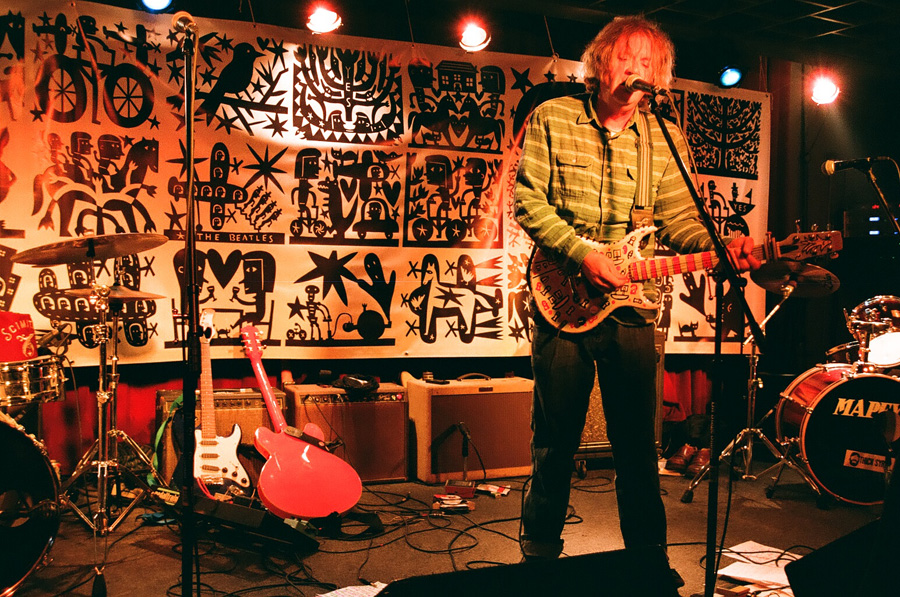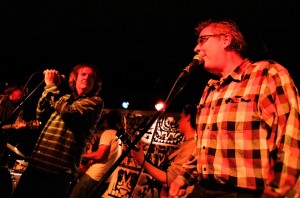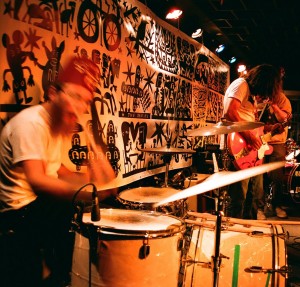Punk rock legends Half Japanese rock out at Maxine’s

After the Half Japanese show at Maxine’s in Hot Springs on October 5, I told Travis McElroy (of Thick Syrup Records), “I think that might be the best show I’ve ever seen, but in order to avoid hyperbole I guess I’ll put it in the Top 3.”
And honestly, I went into it with a little skepticism, knowing little about Half Japanese apart from their historical importance as punk icons and pioneers of the supremely uninhibited and childlike ethos that Daniel Johnston (a close friend and collaborator) further popularized.
 Before the show, there was a screening of “Half Japanese: The Band That Would Be King,” which actually served to make me even more skeptical, (especially before I found out it was made in 1993) due to the overall (sincere) tone of the documentary being “Half Japanese are genius-gods and it’s a travesty that they aren’t the most famous band in all the world,” which can be a little off-putting out of context, especially when it seems pretty obvious why a band that intentionally avoids anything resembling conventional skill wouldn’t sell records like Madonna. The story goes that the big message of punk rock was that anyone could play music – the great democratization of music. Half Japanese are the breathing Platonic form of this idea. So what you get could certainly be called sloppy or juvenile if you’re not into it, and this is where you get the “cult” label and the massive qualifier: if you are into it, it’s transcendent. It’s about being comfortable in your own skin and making your art into a craft (or vice versa).
Before the show, there was a screening of “Half Japanese: The Band That Would Be King,” which actually served to make me even more skeptical, (especially before I found out it was made in 1993) due to the overall (sincere) tone of the documentary being “Half Japanese are genius-gods and it’s a travesty that they aren’t the most famous band in all the world,” which can be a little off-putting out of context, especially when it seems pretty obvious why a band that intentionally avoids anything resembling conventional skill wouldn’t sell records like Madonna. The story goes that the big message of punk rock was that anyone could play music – the great democratization of music. Half Japanese are the breathing Platonic form of this idea. So what you get could certainly be called sloppy or juvenile if you’re not into it, and this is where you get the “cult” label and the massive qualifier: if you are into it, it’s transcendent. It’s about being comfortable in your own skin and making your art into a craft (or vice versa).
Their place in rock n’ roll history is legendary, championed by Kurt Cobain and Mo Tucker (Velvet Underground drummer) and Penn Jillette, who released a great deal of their music on his label. To give some context, sound-wise, Half Japanese connect earlier rock n’ roll to punk rock, much in the same way The Modern Lovers did.
Half Japanese is mostly brothers Jad and David Fair, and for thirty years or so, they’ve been backed by a rotating cast of musicians. Lately, they tend to play with whoever opens for them. Right now, they’ve got Mark Jickling with them playing guitar, who accompanied them on their 1993 tour with Nirvana.
Saturday, they played with Thick Syrup bands Ezra Lbs. and Bloodless Cooties, who each played a set before Jad played a short solo set on his extremely personalized guitar, which he uses in a mostly percussive, dischordant way, and features a rubber band-covered hinge on the base of the neck, which he bends.
 There’s a cliché in music writing where you, Mad Libs-style, compare an artist to another artist by way of a random variable, like “They’re like the Avett Brothers trying musical theater” or “they’re like the redneck version of U2” or something like that (two real things I say about real bands sometimes). I think this tends to cheapen instead of add valuable commentary. But after thinking about it for a while, I stand by my observation that the Half Japanese show was like the Blues Brothers on mushrooms.
There’s a cliché in music writing where you, Mad Libs-style, compare an artist to another artist by way of a random variable, like “They’re like the Avett Brothers trying musical theater” or “they’re like the redneck version of U2” or something like that (two real things I say about real bands sometimes). I think this tends to cheapen instead of add valuable commentary. But after thinking about it for a while, I stand by my observation that the Half Japanese show was like the Blues Brothers on mushrooms.
Jad and David led the show, sans instruments, with Ezra Lbs. (and Ginsu Wives) drummer Daniel Olah on drums, and Jickling on guitar as a base, slowly adding and subtracting (and eventually adding all of) the members of Ezra Lbs and Bloodless Cooties, which gives a feeling of an open-stage policy.
The Fair brothers’ performance is very involved with pushing boundaries – not in a nasty, snarling punk-rock way, but in the sense of breaking down and dissolving what it means to be onstage and performance. There was lots of jumping around, rolling on the floor, raising and lowering mic stands. During the final song, an enormous jam out on the blues standard “Wang Dang Doodle,” (which ended up lasting a good fifteen minutes and “ending” at least five times) Jad got off the stage and wandered lethargically into the crowd to find a chair, mic in hand. Even a low-energy act like that contributes to an exhilarating feeling of mutual involvement between performer and audience.
And I think that’s what Half Japanese is all about. Or maybe I’m missing the point completely.




Comments